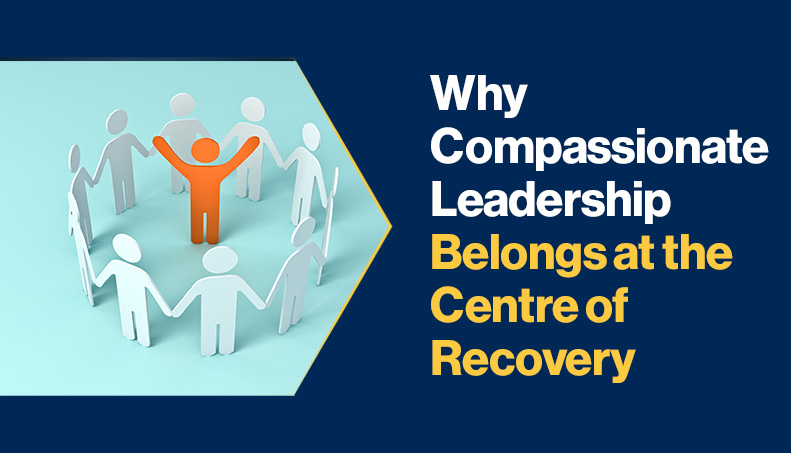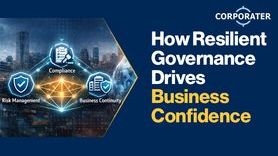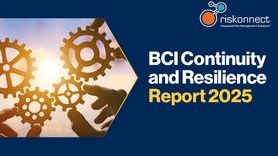Why Compassionate Leadership Belongs at the Centre of Recovery

We are operating in an era of disruption. Natural disasters, cyberattacks, even violence interrupt our lives and our businesses without warning. Business continuity professionals know this. What leaders sometimes overlook is how these crises put pressure on people, in addition to systems and processes. And the way leaders respond to that human impact can make all the difference in how an organization recovers.
Resilience
Business continuity plans often focus on the technical side, like cybersecurity and physical infrastructure. This is essential, but it misses the critical human element.
Accenture’s Resilience Redefined[1] report shows that top performing companies have boosted technology resilience and reduced investment in people resilience. This leaves organizations vulnerable in the aftermath of disruption.
While many wish that resilience means simply returning to how we were the day before something bad happened, that is not what the concept means in practice. As the Accenture report notes, resilience is “more like a trampoline—a dynamic platform that doesn’t just absorb impact but uses it to generate upward momentum.” And you can’t do that without people. Employees (including leadership) can carry the invisible wounds, the psychological stress of surviving a crisis, of any size. When leaders overlook those needs, this blind spot can lead to absenteeism, presenteeism, turnover, eroded morale, and reduced trust.
Compassion as a business imperative
In most organizations, whether or not they want to admit it, there is a hierarchy of compassion, and a crisis highlights those disparities. Whose stories are told? Whose needs get prioritized? Which employees get support and accommodations? Which voices are sought out and which are ignored?
When people feel that their pain is ignored or dismissed, they lose trust in leadership or the organization and disengage. Research reflects how important psychological safety and compassion are. A Harvard Business Review report shows that compassionate leaders are seen as stronger and more competent[2]. McKinsey research demonstrates that psychological safety is critical for effective leadership[3], and employees who feel psychologically safe show higher levels of engagement and innovative behaviour[4]. Compassion is not the soft skill some business leaders think it is—recognizing others’ struggles and providing support is a measurable performance advantage.
Strategies for leaders
Compassion can be built into continuity and recovery with deliberate effort. In practice, it means recognizing that people cannot be their best and cannot contribute when they feel unsafe, invisible, or unsupported. By integrating compassion into leadership practices, policy decisions, and the business structure, organizations build trust. And trust is necessary for true recovery.
Small actions, like acknowledging the difficulty of a situation or checking in with individuals, create signals that the leadership values employees, sees them, and cares about their voices and their needs. Over time, before a crisis hits, those actions add up to build trust and loyalty. Then, when a crisis hits, employees are more likely to stay engaged and want to help the organization rebuild. Without that trust, people withhold information, may not speak up when they witness something amiss, or disengage.
Normalize and validate
- Let employees know it’s okay not to be okay.
- Acknowledge the distress and validate people’s experiences.
- Adjust expectations and be flexible when possible.
Communicate clearly and consistently
- Do not ignore or downplay what happened.
- Share updates regularly, even if the answer is “We’re still figuring it out.”
- Use human language, not corporate statements and detached language.
Build for the long term
- Understand that recovery isn’t linear, and it looks different for everyone.
- Create support systems that last beyond the first few weeks or months.
- Mark milestones (6-months, 1-year, and beyond) with care.
- Train managers to lead with empathy and awareness of invisible wounds.
The path forward
For business continuity professionals, the message is clear: resilience depends on people as much as it depends on systems and policies. Technical plans can get the organization back online and functioning. And compassionate leadership gets the people back online and functioning.
The most resilient organizations have leaders who understand the strategic role of compassion. To ensure your organization is ready for the human side of crisis, start today. Choose one action, such as validating someone’s experience or ensuring an environment of psychological safety. Over time, these steps add up to an organization that comes out of the other side of crisis both marked by the struggle and stronger for it.
Invisible wounds, visible impact
After the Boston Marathon bombings, I had psychological wounds and developed post-traumatic stress disorder (PTSD). Because my injuries were not visible, there were many people, including community leaders, who overlooked my experience. I felt invisible and on top of that, burdened by having to prove to others that my pain was real in order to get support.
- Having to prove I was a victim drained energy that I could have otherwise used to heal.
- Being invisible after a crisis, when others do not recognize the experience as real or valid, makes it easier to stay quiet and disengage.
- Even small acts of recognition make a difference. Survivors often share their stories only when they know someone genuinely cares (like with other survivors), because too often people question or dismiss the experience.
[2] Harvard’s Compassionate Leadership Compassionate-Leadership-How-to-Do-Hard-Things-in-a-Human-Way-Idea-Brief.pdf
[3] What is psychological safety? What is psychological safety? | McKinsey










































